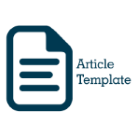A CONCEPTUAL FRAMEWORK FOR ISLAMIC FINTECH SERVICES ADOPTION: EXTENDING THE UTAUT MODEL WITH TRUST
Abstract
The rapid growth of financial technology has revolutionized global financial services especially in developing country. However, the adoption of Islamic fintech remain comparatively limited despite its potential to offer Shariah-compliant financial solutions. This concept paper aims to propose a theoretical framework to better understand the factors influencing the adoption of Islamic fintech services among users. The grounded theory used in this study is Unified Theory of Acceptance and Use of Technology (UTAUT) which incorporated four core determinants which are Performance Expectancy, Effort Expectancy, Social Influence and Facilitating Conditions while extending the model to include Trust as mediating variable. This integration recognizes the unique role of ethical assurance, data protection and Shariah compliance in shaping user behavioural intention within Islamic financial ecosystems. The proposed framework contributes to theory development by adapting UTAUT to a faith-based digital finance context and offers practical implications for policymakers, financial institutions and fintech developers to design strategies that strengthen user trust, improve technological readiness and encourage sustainable adoption. This study hopefully can contribute to the literature by contextualizing UTAUT in an Islamic finance setting where trust and Shariah compliance are key determinants of technology adoption. As conclusion, this study underscores the importance of aligning innovation with Islamic ethical values to enhance financial inclusion and resilience in the digital era.
Keywords
Full Text:
PDFRefbacks
- There are currently no refbacks.
This is an Open Access article distributed under the terms of the Creative Commons Attribution-NonCommercial-NoDerivatives 4.0 International (CC BY-NC-ND 4.0), permitting copy and redistribute the material in any medium or format.




